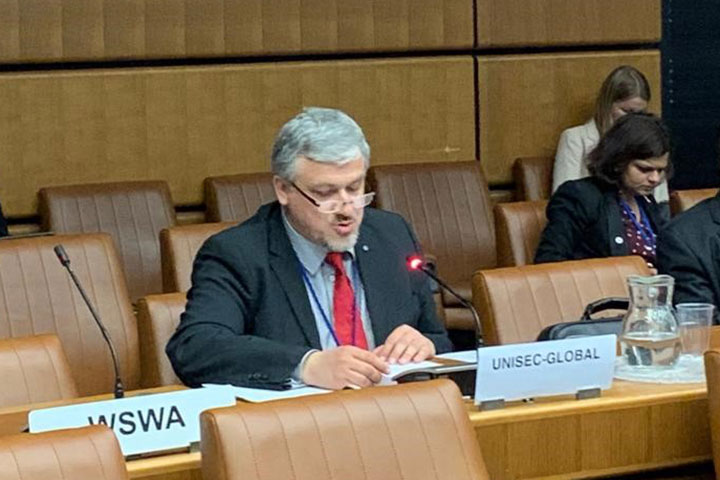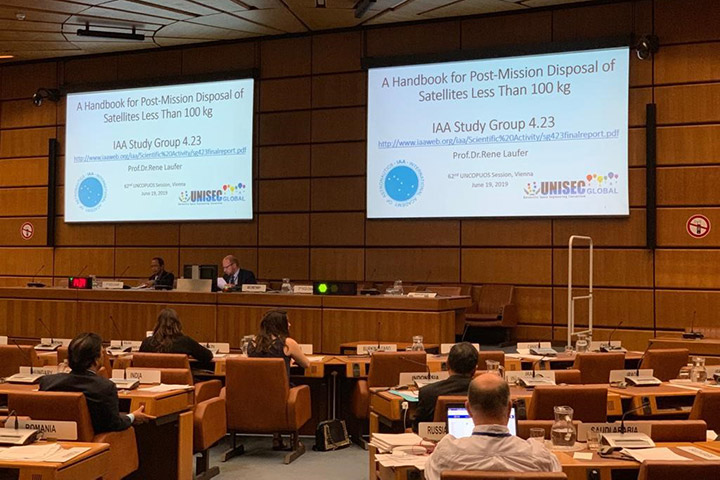CASPER Faculty Member Presents Study Results at United Nations in Vienna


Contact: Whitney Richter, Director of Marketing and Communications, Office of the Vice Provost for Research, 254-710-7539
WACO, Texas (August 13, 2019) – Through an invitation from the United Nations in Vienna, Rene Laufer, Ph.D., presented an international team of experts' study results on post-mission disposal for small satellites at the 62nd United Nations – Committee on the Peaceful Use of Outer Space(UN-COPUOS) Session. Laufer, associate research professor for the Center for Astrophysics, Space Physics & Engineering Research (CASPER) at Baylor University, presented on behalf of UNISEC-Global and the International Academy of Astronautics (IAA).
“It’s definitely an honor to be invited to present the results of our space debris mitigation study at the world’s highest forum of space-faring nations,” said Laufer.
The study, entitled A Handbook for Post-Mission Disposal of Satellites Less than 100kg, was initiated two years ago within the IAA in collaboration with UNISEC-Global and space debris and small satellite experts from five continents.

Activities in space are accelerating with a rapid increase in the growing number of countries building and operating satellites. The actual number of satellites being deployed to orbit is increasing even more quickly. Within the last two decades, the number of satellites deployed has been stable around 1,000 but has recently increased to more than 1,500 satellites being launched within a single year. With the increasing number of satellites being launched, the need for the handbook became even more prevalent.
“Orbital debris has been an issue since our first foray into space,” said Truell Hyde, Ph.D., director of CASPER. “With the push to return to the moon and travel to Mars, this has become an even larger problem making this report both timely and important. Rene’s international connections place CASPER at the center of this issue.”
The purpose of the handbook is to “provide guidance to the designers, developers, and operators of these micro satellites (microsatellites) and smaller satellites (i.e., less than 100 kg) deployed to low Earth orbit, LEO (i.e., below 2,000 km altitude).”
When asked about the study, Laufer identified the handbook as “a great small-satellite community effort of top experts from five continents to address concerns regarding space debris mitigation by providing such a post-mission disposal handbook to emerging or inexperienced new actors.”
“The idea of so-called post-mission disposal, making sure the satellite de-orbits and burns up in the atmosphere as quickly as possible after the end of the mission, is to avoid creating space debris and to minimize the time a satellite orbits in space with the probably of collision with other satellites,” said Laufer. “After a satellites mission, most are often nonfunctional and could cause mass destruction to other functioning satellites or even the International Space Station should a collision occur which may result in even more space debris.”
The study, performed and published within 12 months, spearheaded the team’s ability to advocate the results at conferences to target regulators, policy makers, academia, and emerging and developing countries focused on space discovery. With the results of the handbook, Laufer and experts estimate an increased implementation of internationally agreed recommendations and regulations as well as creating best practices in satellite and mission design.
View Report